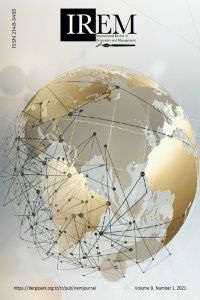Kredi Temerrüt Swapları ve Tahvil Primleri Üzerine Ampirik Bir Çalışma
Çalışmada, CDS (Kredi Temerrüt Swapı) ve Euro-tahvil primleri arasındaki ilişkinin Avrupa Borç Krizi’nin başlangıç dönemini de içine alan Ocak 2009-Kasım 2012 döneminde ne şekilde gerçekleştiği incelenerek, bir öncü gösterge olarak hangisinin daha güçlü olduğunun ortaya konulması amaçlanmıştır. Seçilmiş sekiz ülkeye ait CDS primleri ile Euro-tahvil primleri arasındaki ilişki, birim kök testi ve Granger nedensellik analizi ile incelenmiştir. Bulunan sonuçlar Fransa ve İtalya CDS primlerinin tahvil primlerine yön verdiğine dair kanıtlar sunmaktadır.
Anahtar Kelimeler:
Kredi Temerrüt Swapları, Kredi Türevleri, Tahvil, Eurotahvil
-
In this study, by examining the relationship between CDS (Credit Default Swaps) premiums and bonds during 2009-2012 period that covers The European Debt Crisis period, it is intended to expose which one is more powerful as a leading indicator. The relationship between CDS premiums and bonds premiums of eight countries were examined by unit root test and Granger causality test. Empirical results of France and Italy shows that changes in CDS premiums led to changes in the bond premiums
Keywords:
-,
___
- Arce, Oscar. Sergio Mayordomo. Juan Ignacio Peña. 2013. “Credit-risk valuation in the sovereign CDS and bonds markets: Evidence from the euro area crisis.” Journal of International Money and Finance. S.35. s.124–145.
- Blanco, Roberto. Simon Brennan and Ian W. Marsh. 2005. “An Empirical Analysis of the Dynamic Relation between Investment-Grade Bonds and Credit Default Swaps.” The Journal of Finance.C. LX. S.5.
- Brooks, Chris 2010. Introductory Econometrics for Finance. 10. b. İngiltere: Cambridge University Press
- Chan, Kam C.. Hung-Gay Fung, Gaiyan Zhang. 2009. “On the Relationship Between Asian Credit Default Swap and Equity Markets.” Journal of Asia Business Studies. C.IV. S.1.
- Chan-Lau, Jorge A., Yoon Sook Kim 2004 “Equity Prices, Credit Default Swaps, and Bond Spreads in Emerging Markets”, IMF Working Paper, WP/04/07, February.
- Chan-Lau, Jorge A. 2003. “Anticipating Credit Events Using Credit Default Swaps, with an Application to Sovereign Debt Crises”, IMF Working Paper, WP/03/106, May.
- Chan, K. C., Fung, H. G. and Zhang, G. 2009. “On the relationship between Asian credit default swap and equity markets”, Journal of Asian Business Studies, forthcoming.
- Coudert, Virginie. Mathieu Gex. 2010. “Disrupted links between credit default swaps, bonds and equities during the GM and Ford crisis in 2005.” Bank of France. 31 rue Croix des petits champs. Paris 75001. France.
- Eurostat, http://ec.europa.eu/eurostat/tgm/table.do?tab=table&init=1&language=en&pcode=teina225&plugin=1, 18.04.2015
- Hull, John C. 2012. Options, Futures and Other Derivatives. 8. b. United Kingdom: Pearson Education Limited.
- Kutlar, Aziz. 2000. Ekonometrik Zaman Serileri. Ankara, Gazi Kitabevi.
- Neftci, S., A.O. Santos, Y. Lu. 2003. “Credit Default Swaps and Financial Crisis Predicton.” National Centre of Competence in Research Financial Valuation and Risk Management. Working Paper. s114.
- Pollege, Samuel. Peter N. Posch. 2013.“Managing and trading sovereign risk using credit derivatives and government markets.” The Journal of Risk Finance. C.XIV S. 5. s.453-467
- Realdon, Marco. 2008. “Credit default swap rates and stock prices.” Applied Financial Economics Letters. C.IV. S.4. s.241-248.
- World Investment Report 2014, United Nations Conference on Trade and Development, http://unctad.org/en/Pages/DIAE/World%20Investment%20Report/World_Investment_Report.aspx, 19.04.2015.
- World Bank, http://data.worldbank.org/, 19.04.2015.
- Zhu, Haibin. 2006). “An Empirical Comparison of Credit Spreads between the Bond Market and the Credit Default Swap Market”. J Finan Serv Res. S.29. s.211–235
- Zhang, Gaiyan. Jot Yau and Hung Gay Fung. 2010. “Do credit default swaps predict currency values?” Applied Financial Economics. S.20. s.439–458
- ISSN: 2148-3493
- Yayın Aralığı: Yıllık
- Başlangıç: 2013
- Yayıncı: Gökhan ÖZER
